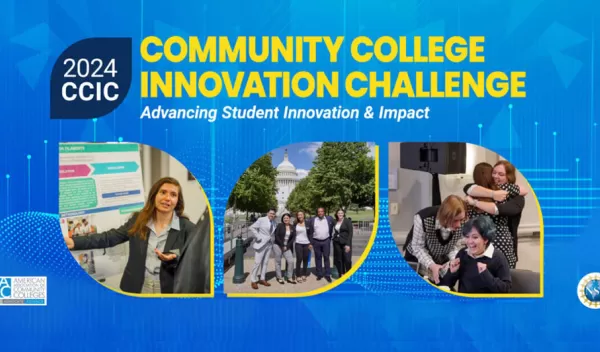
NSF and AACC announce 2024 Community College Innovation Challenge winners
Today, the U.S. National Science Foundation, in partnership with the American Association of Community Colleges (AACC), announced the three winning teams of the 2024 Community College Innovation Challenge (CCIC).
The annual competition seeks to strengthen entrepreneurial thinking among community college students by challenging them to develop STEM-based solutions to real-world problems. It also enables students to discover and demonstrate their ability to translate knowledge into action and initiate real-world change.
"Year after year, I am thrilled to witness the promising talent that the Community College Innovation Challenge brings together," said James L. Moore III, assistant director for STEM Education. "The student participants represent both the present and future of STEM by addressing some of the most pressing challenges of our times. NSF is proud to co-sponsor CCIC and to congratulate the students for doing an outstanding job translating their knowledge into action."
The first, second and third-place winning teams and their innovations are listed below.
First Place Winner
Perimeter College at Georgia State University, Georgia: The Perimeter College team seeks to redesign cervical cancer screening by offering a noninvasive alternative to the speculum. By making screening more accessible, this alternative has the potential to impact cervical cancer mortality rates, especially in low-income countries.
Second Place Winner
Dallas College, Texas: Autonomous Monitoring for Blaze Emergency Response (AMBER) is an early detection system that uses infrared cameras and sensors to alert farmers and local authorities to fire risks. With a third-party drone provider, AMBER can quickly track and mobilize a rapid-fire response and preserve agricultural land.
Third Place Winner
County College of Morris, New Jersey: The County College of Morris team proposes to safely and efficiently increase the world's energy supply through a molecular solar thermal system. This system is nontoxic, cost-efficient and can capture light energy as heat, converting stored heat into usable energy.
This week, 12 community colleges selected as finalists in a national competition attended an innovation boot camp, where they learned from entrepreneurs and experts in business planning, stakeholder engagement, strategic communication and marketplace dynamics. The boot camp culminated in a student poster session with STEM leaders and congressional stakeholders and a 5-minute pitch presentation to a panel of industry and entrepreneurial professionals determining the winning teams.
"Truly inspiring," said Walter G. Bumphus, president and CEO of AACC. "We are so proud to be afforded the opportunity to provide these resources for community college students to showcase their innovative and creative solutions to real-world issues. The projects featured show the amazing potential these students have to make meaningful economic and societal impact. Congratulations to the team from Georgia Perimeter College at Georgia State University and to all of the finalists."
This year, the 12 finalist teams presented solutions that addressed clean water, renewable energy and energy storage, HIV treatment, women's health care, fire prevention, combating plastic waste, and accessibility for people with disabilities.
